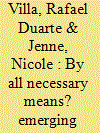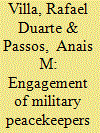| Srl | Item |
| 1 |
ID:
172106


|
|
|
|
|
| Summary/Abstract |
Emerging powers from the global south have generally opposed the use of force in international politics. However, taking a closer look at the area of peacekeeping, the international community’s most institutionalized response to international insecurity, it is clear that the global south has been actively engaged in what has been described as peacekeeping’s coercive turn: the increasingly greater use of force. Building on the cases of Brazil and Indonesia, we argue that the peacekeeping policies of these emerging powers have been inconsistent with their declared reticence to use force. We explain the inconsistency by reference to knowledge imbalances between civilian and military actors, a gap in peacekeeping expertise and involvement in policy-making that allowed the armed forces to push the two countries into increasingly coercive peacekeeping. Moreover, civil–military knowledge imbalances prevented the emergence of alternative ideas more in line with Brazil’s and Indonesia’s traditional stance on the use of force.
|
|
|
|
|
|
|
|
|
|
|
|
|
|
|
|
| 2 |
ID:
190787


|
|
|
|
|
| Summary/Abstract |
Peacekeepers are seen as a UN tool for promoting domestic changes in host countries, but little is known about the political consequences when officers return home. During the last 10 years, Brazilian presidents appointed a significant number of former peacekeepers to key political functions. How and why do former peacekeepers end up so involved in government affairs? To answer this question, this paper focuses on the array of skills acquired by peacekeepers in domestic missions and reinforced abroad. Drawing on a set of semi-structured interviews and questionnaires to military, former political decision-makers, and researchers, as well as other primary and secondary sources, this paper details how political articulation, experience in conflict management, and prestige empowered Brazilian military officers to resume their tradition of intervention in politics. This paper also shows that peace operations can produce deleterious outcomes for troop-contributing countries in the Global South.
|
|
|
|
|
|
|
|
|
|
|
|
|
|
|
|